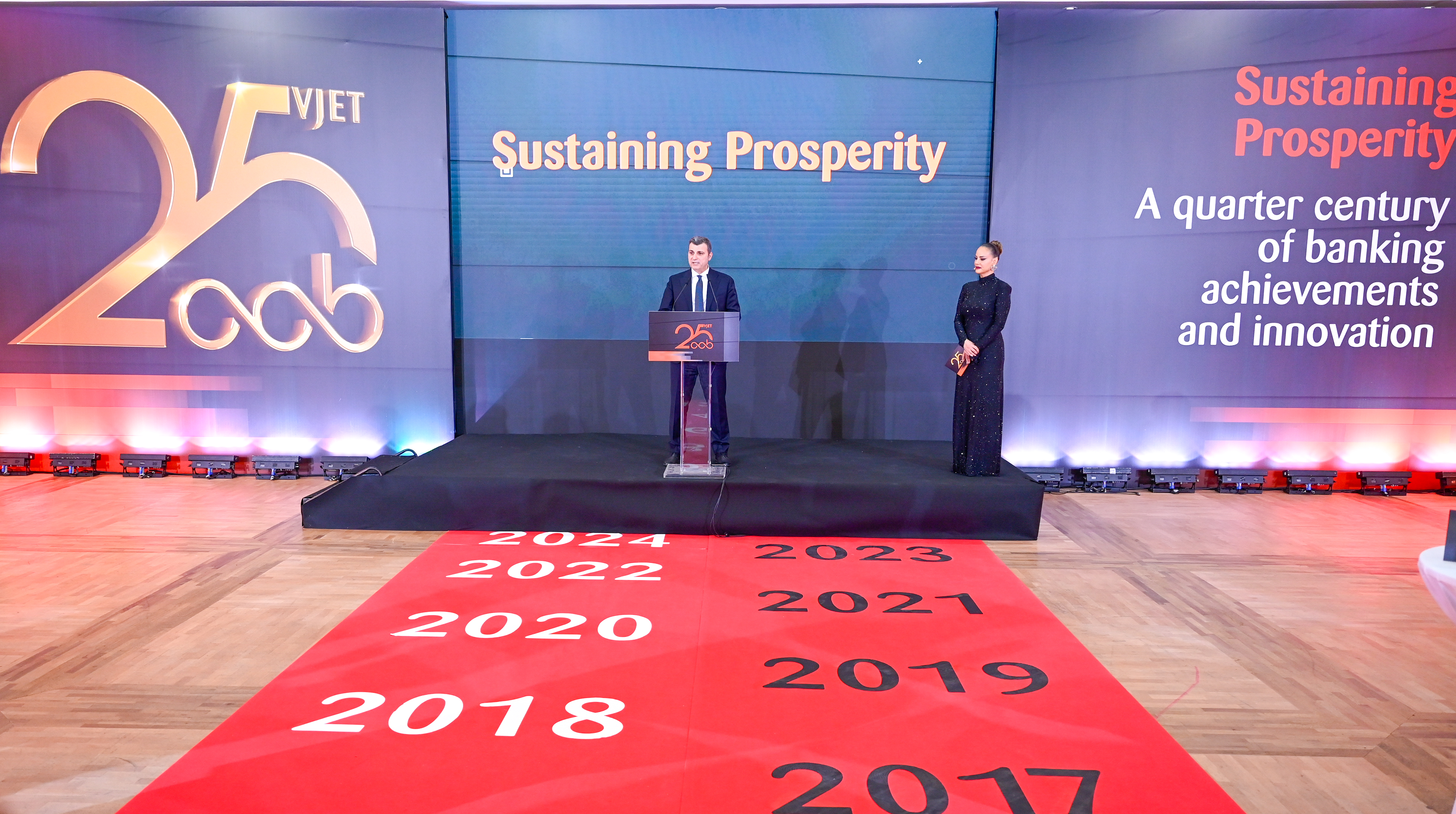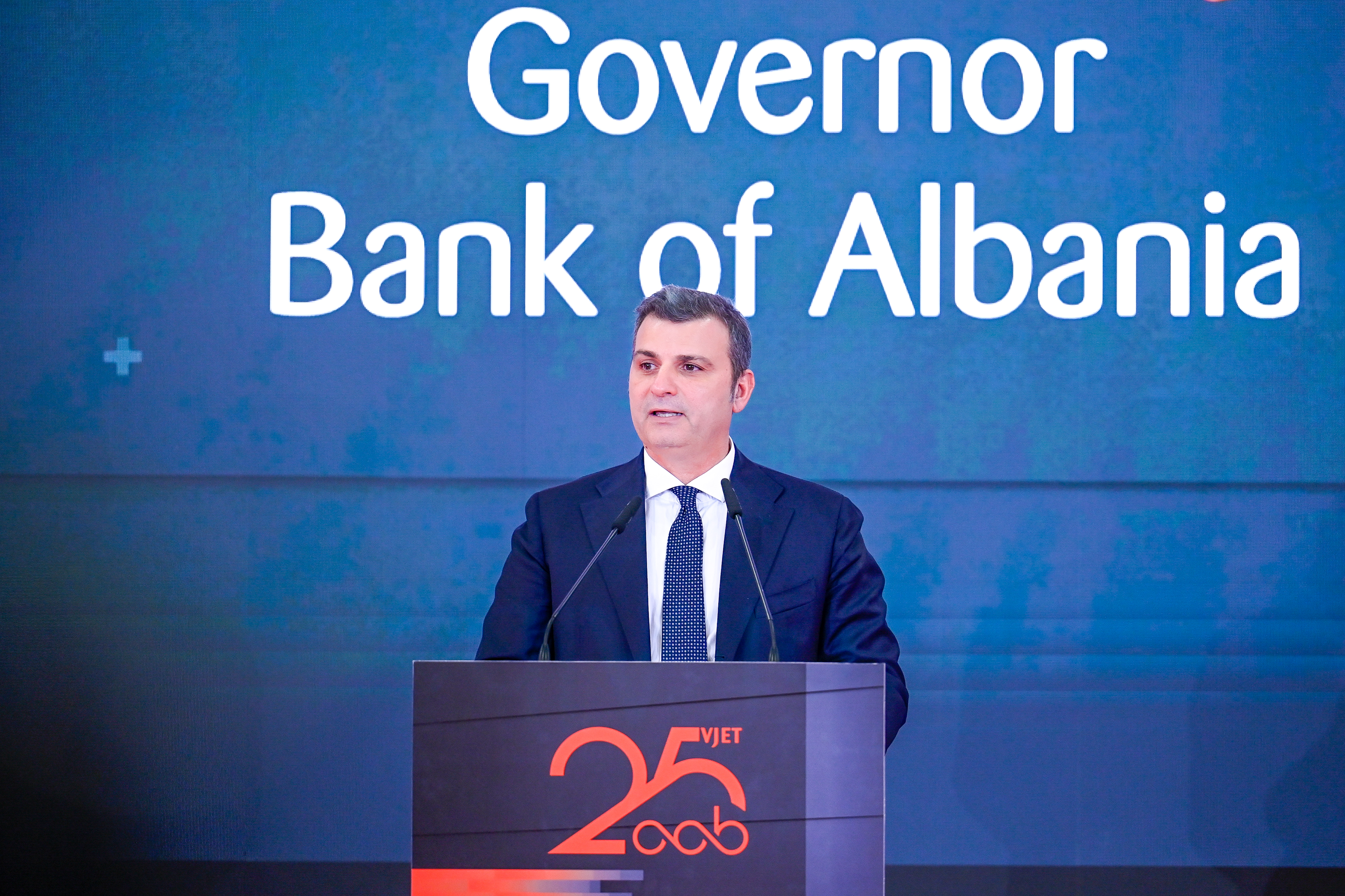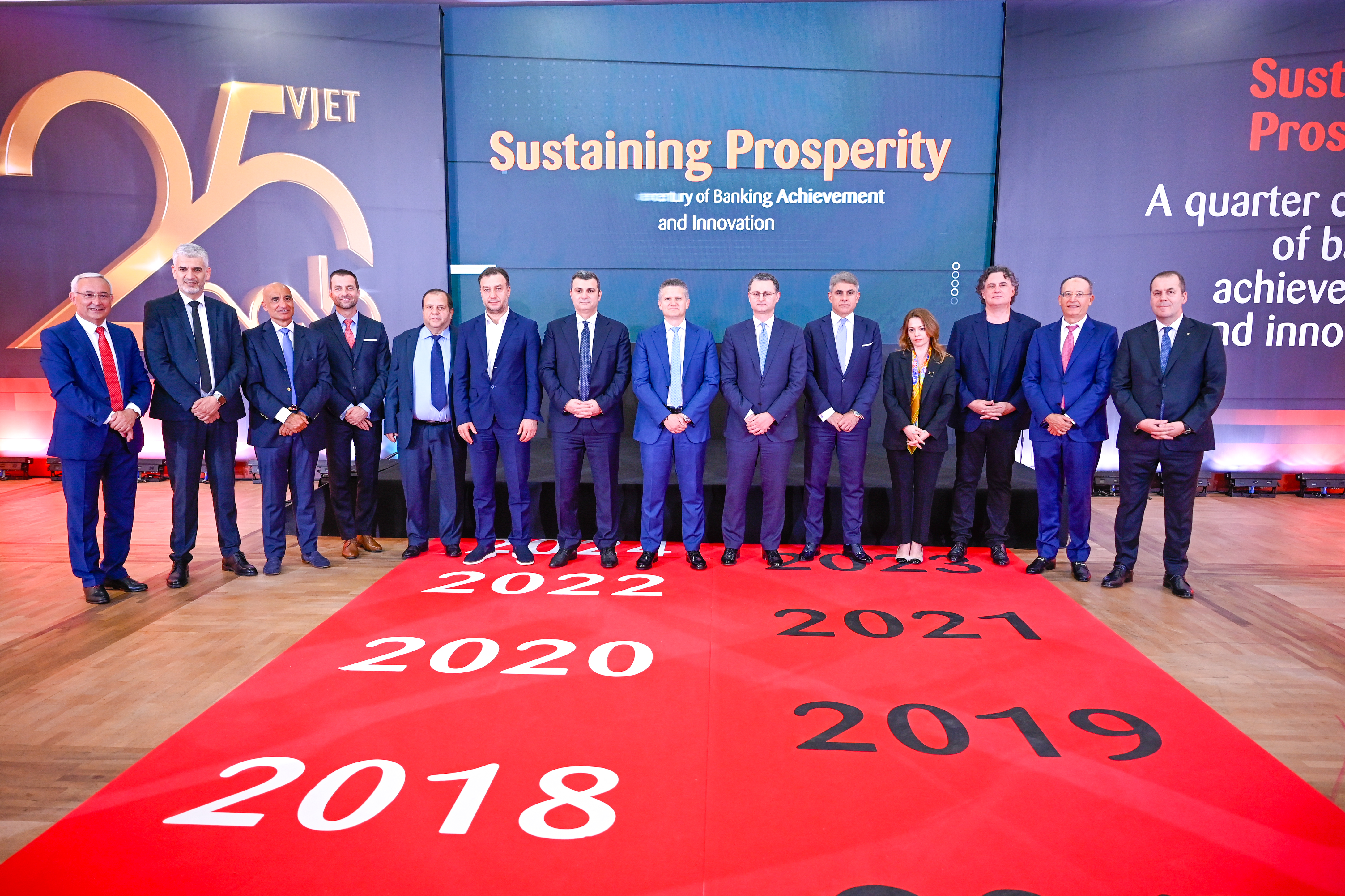BANK OF ALBANIA
PRESS RELEASE
Governor Sejko: Address to the 25th Anniversary of Albanian Association of Banks
Publication date: 14.05.2024
Dear members of the Albanian Association of Banks,
Dear colleagues,
I am particularly delighted to join you today celebrating the 25th Anniversary of the Albanian Association of Banks.
The Albanian Association of Banks, for almost 25 years, has provided a significant contribution in the advancement path of the banking system, in turn backing the financial and economic stability and progress in Albania. Your efforts for development have been crucial, while being concretely engaged and in an active manner for adopting the best practices as provided by the global banking industry.

Over these years, the banking system has supported and undertaken many initiatives, thus paving the path for adopting the standards that nowadays define the modern banking system in Albania. Your efforts in promoting sound financial practices and ethical banking standards have already shaped the landscape of the banking industry.
Services provided to customers have been revolutionised, banks have considerably expanded their network, by increasingly offering banking and financial services that were once considered beyond the scope of traditional banking.

The Albanian economy has continuously faced domestic and external shocks, which have challenged both the banking industry development and the economic and financial stability of Albania, such as:
- The global financial crisis of 2008;
- The outbreak of Greek crisis which precipitated in a sovereign debt crisis in euro area, in 2011-2013;
- The Covid pandemic 2020-2021; and
- Economic consequences from the war in Ukraine.

Despite the waves of these turbulences, the banking system has provided a decent contribution by enabling a rapid growth of credit to the economy, to 30% of GDP in 2023, from 7% of GDP in 2002. In addition, it supported the development of the private sector, through offering consultancy to Albanian businesses and households, as well as enhancing their financial literacy. Last but not least, the Albanian banking sector has supplied to the economy a wide and increasing range of payment instruments, which enable the efficient circulation of liquidity and capital in the economy.

Also, I would like to evidence that the establishment of the AAB, in its current form, has provided to the Bank of Albania a reliable interlocutor and partner in discussing the projects and reforms that we have undertaken over the years. Sharing ideas and the exchange of views have been essential in identifying the problems encountered throughout this development and in adopting the most effective instruments for addressing them.
In this regard, let me emphasize that altogether: the Albanian Government, Bank of Albania and ABB, have carried out a great work in realising certain fundamental structural reforms over the last decade.
Allow me to be specific.
First, the plan of measures for reducing non- performing loans and improving the lending environment. The non-performing loans ratio peaked at almost 25% credit portfolio in 2014, posing a major challenge for the development of the banking system and a serious obstacle to credit growth.
To address this problem, in 2015, the Bank of Albania together with the Albanian Government and the AAB adopted the National Plan for the Reduction of Non-performing. A set of important reforms have been implemented in the framework of this plan. These reforms enabled non-performing loans in banks’ balance sheet reduce currently to 4.64%. Also, these reforms paved the way for the rapid, stable and sound growth of bank credit. Credit growth to private sector - stated in figures and referring to the same five-year horizon – has increased with a cumulative value of 40%. Only in the last year, credit to the private sector recoded an average growth of 8%. In the first quarter of 2024, this growth has climbed close to 12%.
Second, the consolidation of banking system, as an instrument for enhancing its competitiveness and reorganisation, was concluded successfully. This process, while taking place as dictated from the strategies and policies of European banking groups, presented many challenges. Nevertheless, ultimately, it resulted in a more sound competition, an increased share of the domestic capital and improved financial intermediation.
Third, the enhancement of financial inclusion – though an ongoing process – has brought significant benefits to the Albanian economy. As a result of joint implemented reforms in payment systems and the continuous investment to increase financial education, we have achieved a remarkable progress over the last years:
- Around 171,654 adult citizens or around 78% of the adult population have access to bank accounts (2023);
- Access to bank accounts via internet has increased by around 17 times (11,108 accounts in 2008 - 1,096,402 accounts in 2023);
- Currently (2023), transactions carried out via banks amount around 7.7 million (from only about 88.000 in 2008), accounting ALL 2,004,180 or 88% of GDP in 2023);
- The number of bank cards has almost tripled since 2008. Currently, Albanian citizens own 1,433,151 debit and credit cards of the prestigious VISA and Mastercard companies, which have implemented standards from the best at international level;
- Significant increase of POSs in Albanian businesses by around 6 times from 2008 (about 300 POSs) to 2023 (about 19 000 POSs);
- Currently, there are around 230 businesses equipped with the necessary infrastructure for e-commerce, from a total of 3 in 2013, when it was introduced for the first time this service from the banking system;
- The number of bank card payments has increased 83 times since 2008.
In 2023, the Albanian citizens have carried out an average of 11 payments per capita, from 0.3 payments per capita in 2008 via bank cards.
As we reflect on the past years, despite the various domestic and external challenges, we can say that - despite the shocks on inflation and monetary tightening over the last few years, both in Albania and in the euro area - the Bank of Albania and AAB have continued to work for:
- drafting and approving many legal and regulatory acts in accordance with the European directives and best practices in the field of regulation and micro- and macro-prudential supervision, resolution, payments, statistics, etc.;
- continuously modernizing the payment system, establishing and developing payment schemes, such as direct debit, as well as the increase in the use of electronic payment instruments, etc;
- building cooperation bridges and improving communication with domestic and international institutions to help the financial sector in Albania;
- organising many events and programs to educate the public, promoting financial inclusion and reducing the use of cash in the economy.
***
Dear colleagues,
Banks play a key role in the economic structure of Albania. We have a common mission: bolstering a strong financial and economic environment, which continues to remain challenging. Forward-looking and due to global changes and developments taking place, the Bank of Albania:
- remains committed to fulfilling its legal objectives, always implementing policies aimed at safeguarding the monetary and financial stability of Albania, as a prerequisite for the sustainable and long-term development;
- encourages the further increase in lending to Albanian businesses and households, always requiring for compliance with the prudential requirements, but at the same time insisting on increased attention to specific sectors or vulnerable groups of the society;
- has encouraged and will encourage the drafting of policies and the adoption of instruments that expand financial inclusion for those segments of society not yet fully served;
- considers that the cooperation between us (the Bank of Albania and the banks) remains decisive, particularly regarding the alignment of its legal and regulatory framework with that of the European Union;
- supports the digital transformation of the banking sector as a trend and an opportunity to improve banking services, making them more accessible and faster for the public, while strengthening at the same time public confidence in regard to the latter;
- last, we forecast to advance towards more stable banking practices, by supporting projects that affect positively the environment.
In conclusion, on this 25th anniversary, let us renew our commitment to: (i) dedication, (ii) integrity, and (iii) high quality service to the public.
Despite the achievements and challenges, which will be present over the next years, I am confident that the Albanian banking sector will become a synonym of sustainability and innovation.
Thank you for your commitment and trust in our mutual cooperation.
Happy 25th Anniversary!

 Linkedin
Linkedin
 Twitter
Twitter
 Facebook
Facebook
 Instagram
Instagram
 Flickr
Flickr
 RSS
RSS
 Subscribe
Subscribe
 Feedback
Feedback